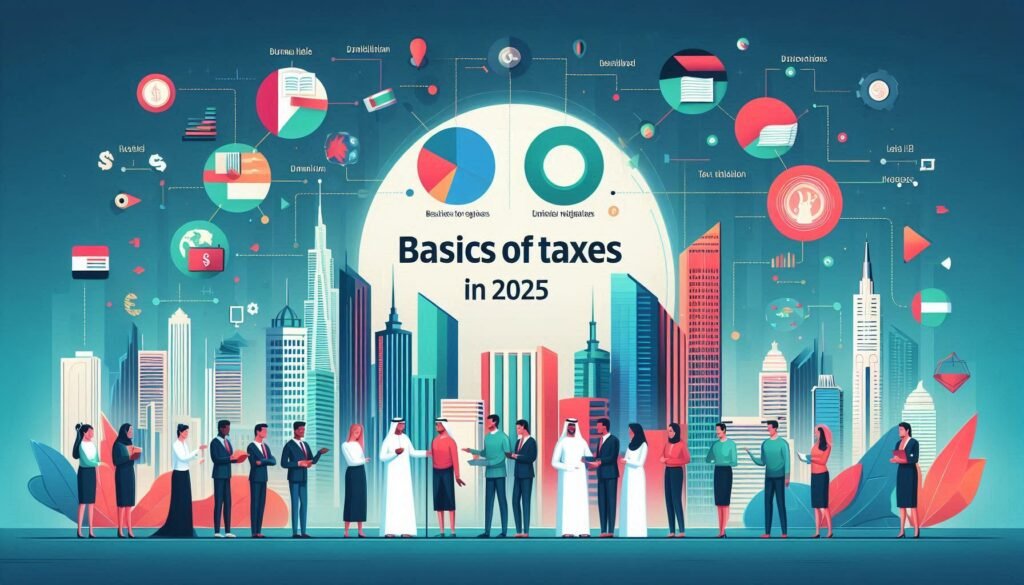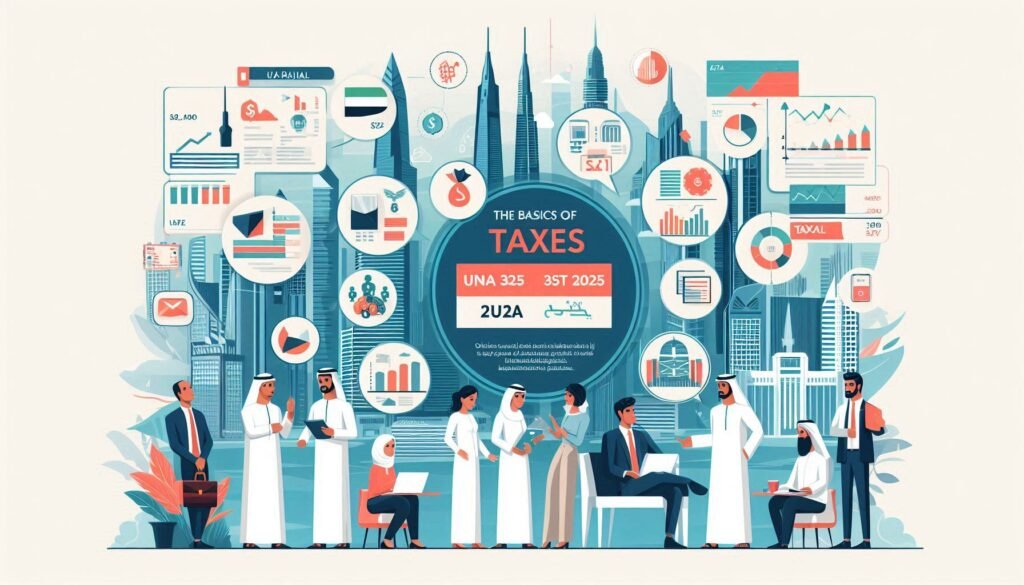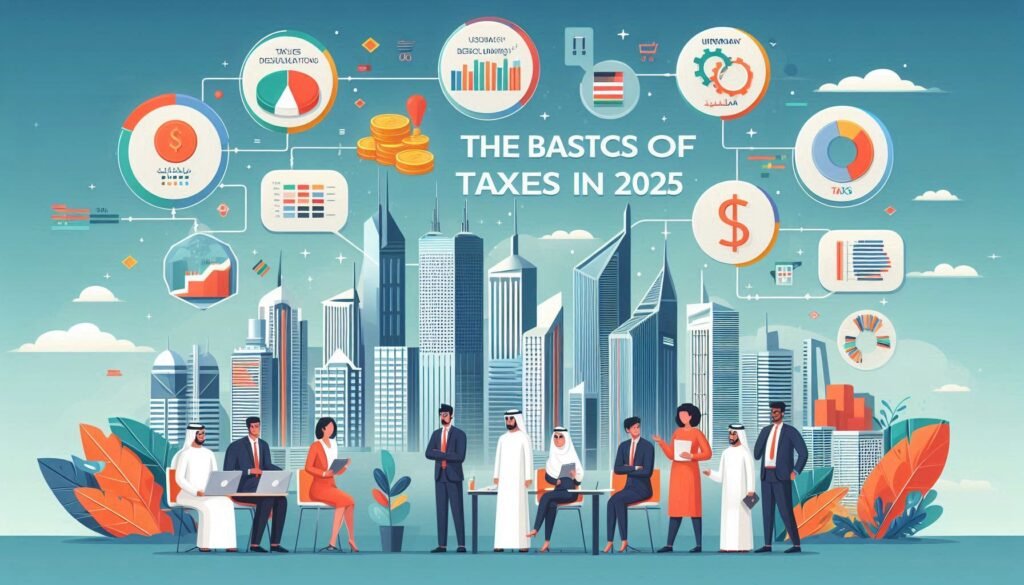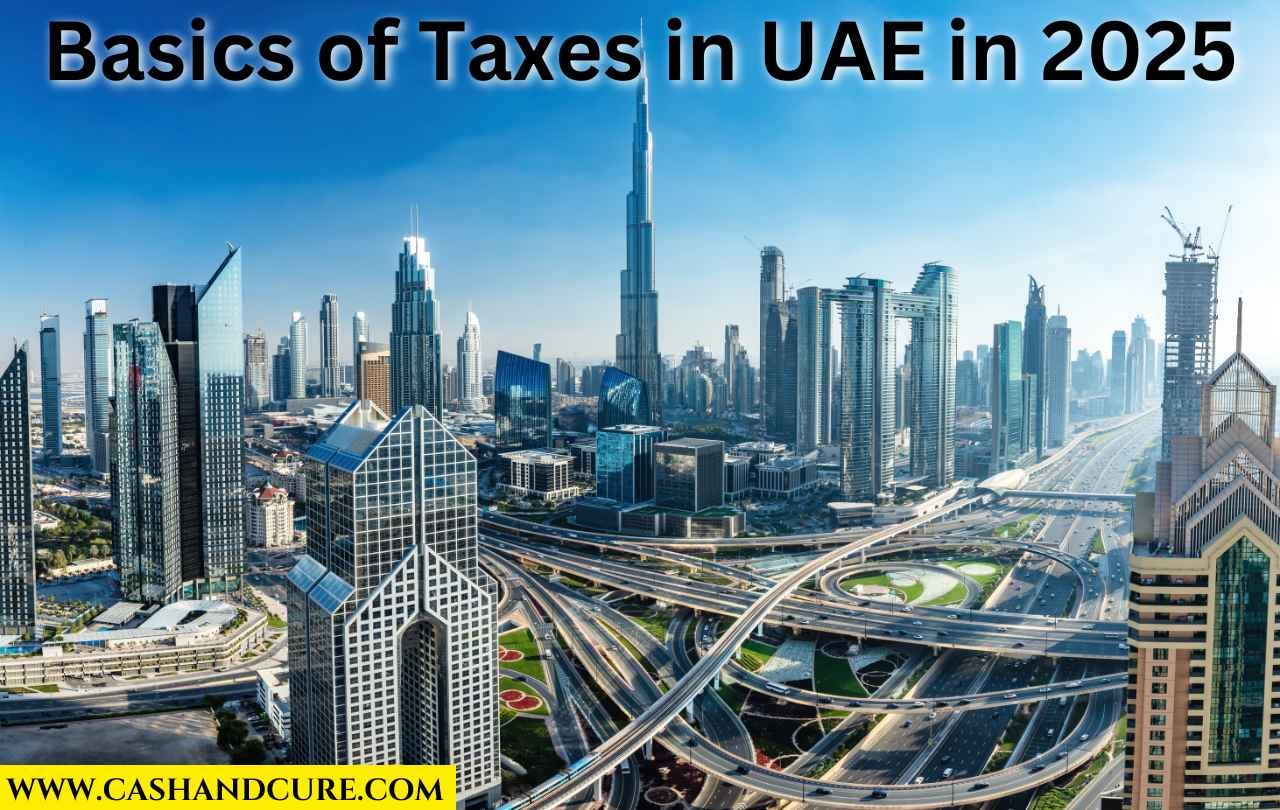The United Arab Emirates (UAE) has long been known for its tax freedom, which attracts a lot of businesses and investors from around the world. However, recent changes in tax regulations are going to bring a lot of change in 2025. Businesses must adapt to these changes and ensure compliance with them. The amendments aim to clarify certain aspects, support specific sectors, and make numerous efficiency improvements. It is important to review the updated VAT law and seek expert advice if needed.
Basics of Taxes in UAE in 2025

Overview of the UAE Tax System
The UAE’s tax system is divided into two main categories:
- Direct Taxes
- Indirect Taxes
Direct taxes include corporate income tax, while indirect taxes include levies such as value-added tax (VAT) and excise.
Corporate Income Tax
One of the most significant changes to the UAE’s tax system is the introduction of corporate income tax. From January 1, 2025, the UAE will introduce a 15% minimum tax on the profits of large multinational enterprises (MNEs) with consolidated global revenues of €750 million ($793 million) or more. This change brings the UAE in line with global tax standards and promotes fairness in the taxation of large companies operating in the country.
Value Added Tax (VAT)
VAT was introduced in the UAE on January 1, 2018, at a standard rate of 5%. It applies to most goods and services with certain exemptions and zero-rated supplies. Businesses are required to register for VAT if their taxable supplies and imports exceed the mandatory registration threshold of AED 375,000.
Excise Duty
Excise duty is imposed on specific goods that are harmful to human health or the environment. These goods include tobacco products, energy drinks and carbonated beverages. Excise duty rates vary depending on the product category.
Tax Incentives in Free Zones
The UAE offers various tax incentives for businesses operating in free zones. These incentives include exemption from corporate income tax, customs duty and VAT. Free zones are designed to attract foreign investment and promote economic diversification.

Key Changes in 2025
- Corporate Income Tax: As mentioned earlier, the introduction of a 15% minimum tax on large MNEs is a significant change. This tax aims to ensure that large corporations contribute their fair share to the UAE economy.
- Emiratisation Targets: The UAE government is increasing its Emiratisation targets to boost employment for Emiratis. Companies with 50 or more employees must ensure that 7% of their workforce is Emirati by mid-2025.
- Environmental Initiative: Dubai is expanding its plastic waste reduction initiatives by banning Styrofoam containers, cups, plastic stirrers, straws, table covers, and cotton buds with plastic stems from January 1, 2025. This initiative is in line with the UAE’s commitment to sustainability.
- Health Insurance Mandatory: Starting January 1, 2025, the UAE will introduce basic health insurance for all private sector and household employees who do not already have coverage. This mandate ensures that more employees across the country have access to affordable healthcare.
How to improve your tax strategy
- Understand new regulations: Stay up to date on the latest tax regulations and reforms. Check regular updates from the Federal Tax Authority (FTA) and consult tax professionals to ensure compliance.
- Take advantage of tax incentives: Take advantage of tax incentives offered in free zones. These incentives can substantially reduce your tax liability and increase the profitability of your business.
- Keep accurate records: Keep detailed and accurate records of all financial transactions. Proper documentation is essential for tax compliance and helps you avoid penalties during tax audits.
- Plan for Emiratization: If your company has 50 or more employees, start planning to meet Emiratization goals. Implementing strategies to hire and retain Emirat employees helps you comply with the new regulations.
- Invest in sustainability: Align your business practices with the UAE’s environmental initiatives. Reducing plastic waste and adopting sustainable practices not only helps you comply with regulations but also enhances your company’s reputation.

Key information on taxes in Dubai and the UAE
1. Dubai personal income tax rate
Like the rest of the UAE, Dubai does not impose personal income tax on individuals. This means that residents and expatriates working in Dubai pay no income tax on their income.
2. Income tax rate in the UAE for foreigners
Foreigners living and working in the UAE enjoy the same tax benefits as residents. There is no personal income tax for foreigners, which makes the UAE an attractive destination for expatriates. However, it is important to note that business income over AED 375,000 is subject to a 9% corporate tax.
3. What is the income tax in Dubai
There is no personal income tax for individuals. This applies to both residents and expatriates. The only taxes that apply are corporate tax on business income and VAT on goods and services.
4. Countries that do not charge foreign income tax
Many countries around the world do not charge taxes on foreign income. Some of these countries are as follows:
- United Arab Emirates: No personal income tax on foreign income.
- Bahamas: No income tax on foreign income.
- Cayman Islands: No personal income tax.
- Monaco: No income tax for residents.
- Bermuda: No income tax on foreign income.
5. Dubai Rental Income Tax
Rental income in Dubai is generally tax-free for both domestic and foreign property owners. This means that landlords do not have to pay income tax on their rental income. However, there is a 5% Dubai Municipality housing fee, often referred to as a rental tax, and it is included in monthly utility bills.

Frequently Asked Questions
The new corporate income tax rate is 15% for large multinational enterprises with consolidated global revenues of €750 million ($793 million) or more.
Yes, businesses operating in free zones can benefit from various tax incentives including exemptions from corporate income tax, customs duties and VAT.
The standard VAT rate in the UAE is 5%.
Companies with 50 or more employees must ensure that 7% of their workforce is Emirati by mid-2025.


Leave a Reply
You must be logged in to post a comment.